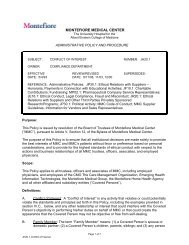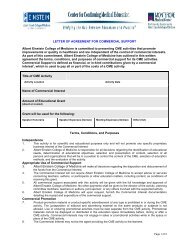Medical Staff House Staff Orientation Manual - Montefiore Medical ...
Medical Staff House Staff Orientation Manual - Montefiore Medical ...
Medical Staff House Staff Orientation Manual - Montefiore Medical ...
Create successful ePaper yourself
Turn your PDF publications into a flip-book with our unique Google optimized e-Paper software.
Bioethics (Moses) 718-920-6226<br />
(Weiler) 718-904-2299<br />
Office of the <strong>Medical</strong> Director 718-920-7052; 2809; 6078<br />
FOREGOING LIFE-SUSTAINING TREATMENT<br />
Summary - Administrative Policy and Procedure # JA12.1<br />
Note: This summary contains the key points of this policy. For a complete understanding of all<br />
the relevant provisions, it is necessary to thoroughly read the full policy.<br />
WHAT:<br />
This policy delineates the roles of the physician and the members of the health care team in<br />
guiding patients, their health care agents, family or other surrogates in end-of-life decision<br />
making. In recommending and responding to decisions about foregoing (withholding or<br />
withdrawing) life-sustaining treatment, physicians and other clinicians should be guided by the<br />
following principles:<br />
• Physicians and other clinicians have no medical, legal or ethical obligation to offer or<br />
provide treatment(s) that are not medically indicated or to offer or provide treatment that<br />
would increase a patient’s suffering or merely prolong the dying process.<br />
• Any decision to forego life-sustaining or other medically indicated treatment(s) should<br />
trigger a process of discussion about the reasons for the decision, the consequences of<br />
foregoing treatment and the range of appropriate therapeutic options, including palliative<br />
care. A Palliative Care Medicine or a Bioethics consult and/or a family meeting may be<br />
helpful in clarifying the goals and plan of care.<br />
• Physicians caring for a patient who is terminally ill should discuss a palliative care plan or a<br />
time-limited course of supportive treatment (e.g., dialysis) with the capacitated patient or<br />
surrogate. These discussions should include a review of the patient’s condition and<br />
prognosis and the patient’s present (or prior) declared health choices.<br />
WHO:<br />
• The patient, family or anyone on the health care team may initiate a discussion about<br />
foregoing treatment.<br />
• The patient’s attending physician determines when foregoing treatment is medically<br />
indicated and recommends this course to the capacitated patient, or the health care agent or<br />
other surrogate who makes decisions for the incapacitated patient.<br />
WHEN:<br />
Foregoing life-sustaining treatment is appropriate whenever a patient’s condition and prognosis<br />
are such that one or more interventions are likely to merely prolong dying or increase suffering<br />
without providing substantial benefit.<br />
WHERE:<br />
Orders to forego life-sustaining treatment may be appropriate in any clinical setting.<br />
100

















